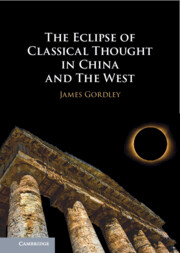Book contents
- The Eclipse of Classical Thought in China and the West
- The Eclipse of Classical Thought in China and the West
- Copyright page
- Dedication
- Contents
- Acknowledgments
- 1 The Dilemma
- Part I Two Ancient Traditions
- 2 The Beginnings of Ethical Philosophy
- 3 The Challenge to Virtue and the Discovery of Human Nature
- 4 A Normative Psychology
- 5 The Universality of Normative Standards
- 6 Justice, Propriety, and the Common Good
- 7 Government
- Part II The Formation of Two Constitutions
- Part III The Eclipse of Classical Thought
- Appendix The Encounter with the Abrahamic Religions
- Index
2 - The Beginnings of Ethical Philosophy
from Part I - Two Ancient Traditions
Published online by Cambridge University Press: 26 July 2022
- The Eclipse of Classical Thought in China and the West
- The Eclipse of Classical Thought in China and the West
- Copyright page
- Dedication
- Contents
- Acknowledgments
- 1 The Dilemma
- Part I Two Ancient Traditions
- 2 The Beginnings of Ethical Philosophy
- 3 The Challenge to Virtue and the Discovery of Human Nature
- 4 A Normative Psychology
- 5 The Universality of Normative Standards
- 6 Justice, Propriety, and the Common Good
- 7 Government
- Part II The Formation of Two Constitutions
- Part III The Eclipse of Classical Thought
- Appendix The Encounter with the Abrahamic Religions
- Index
Summary
The classical traditions that we will study began in China with Confucius, and, in the West, with Socrates, who was born less than thirty years after Confucius died.
Both had a sense of divine mission although neither said a great deal about the divine. Both regarded political life as one of the noblest of vocations yet neither of them held political office. They were teachers. The task they set for themselves was to help others acquire the moral qualities they needed to live a worthwhile life. Both believed that there was no better qualification for political life than the possession of these qualities.
- Type
- Chapter
- Information
- The Eclipse of Classical Thought in China and The West , pp. 21 - 29Publisher: Cambridge University PressPrint publication year: 2022

